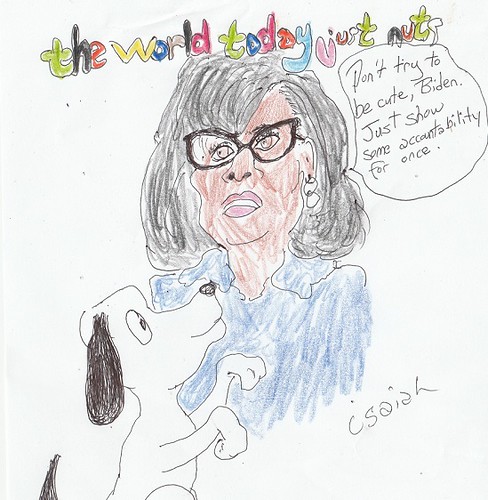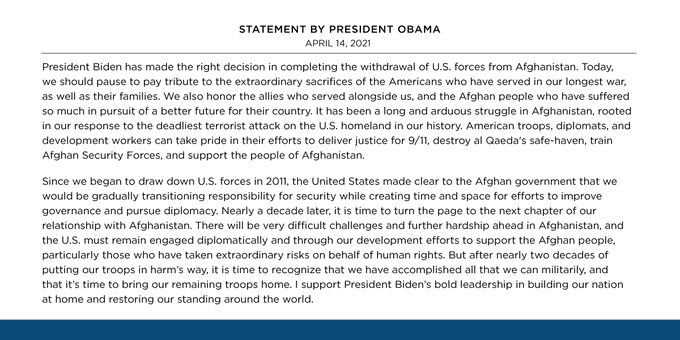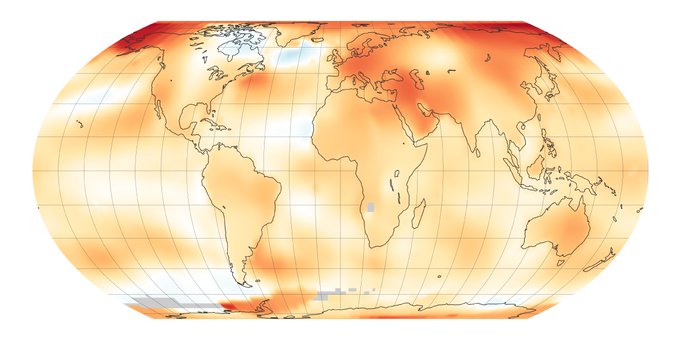
Isaiah's latest THE WORLD TODAY JUST NUTS "Accountability." As Joe poses for Anita Hill, Anita declares, "Don't try to be cute, Biden. Just show some accountability." Isaiah archives his comics at THE WORLD TODAY JUST NUTS.
Friday, April 16, 2021. There is no win in the wars in Iraq or Afghanistan -- is there a reason Australia's msm can discuss that but the US msm can't?
Starting with this from Iraq and Afghanistan Veterans of America:
FOR IMMEDIATE RELEASE:
April 14, 2021
CONTACT: press@iava.org
New York, NY – In response to President Biden’s decision to fully withdraw US troops from Afghanistan by September 11, 2021, Iraq and Afghanistan Veterans of America (IAVA) released the following statement:
“Over the last 20 years, the veteran community has grown by millions of American servicemembers, seen 20,722 injured on active duty, and 2,488 die serving their country in Afghanistan. These are the men and women IAVA fights for,” said Jeremy Butler, CEO of IAVA. “While there are no perfect solutions to the conflict, there are solutions to protect and support the millions of veterans left in its wake. The Warfighters Act, a bipartisan bill that establishes new VA benefits for veterans suffering health conditions caused by toxic exposures, is an example of one such solution that IAVA is fighting for everyday.
“In addition to supporting our veterans who face health challenges due to toxic exposures, the post-9/11 generation of veterans faces the highest proportion of suicides and mental health challenges due to their service. This is why IAVA urges quick and effective implementation of the Hannon Act, which is the most comprehensive piece of legislation addressing veteran suicide and was passed into law last year.”
“Finally, IAVA stands with the Afghan and Iraqi citizens who seek visas under the Special Immigrant Visa (SIV) program. The US partnered with these brave men and women for years and we must ensure that the SIV program is used to its fullest potential and that we keep our promises to our allies overseas.
“We hope the Biden Administration will prioritize efforts like the Warfighters Act and continue to find other ways to protect those who have served in Afghanistan as it considers its withdrawal plan. IAVA remains ready to support the administration and work alongside Congress and the VA in its efforts to do so.”
IAVA is the voice for the post-9/11 veteran generation. With over 400,000 veterans and allies nationwide, IAVA is the leader in non-partisan veteran advocacy and public awareness. We drive historic impacts for veterans and IAVA’s programs are second to none. Any veteran or family member in need can reach out to IAVA’s Quick Reaction Force at quickreactionforce.org or 855-91RAPID (855-917-2743) to be connected promptly with a veteran care manager who will assist. IAVA’s The Vote Hub is a free tool to register to vote and find polling information. IAVA’s membership is always growing. Join the movement at iava.org/membership.
###
And let's note Melanie's "Till They All Get Home."
Biden is the third American president to promise to end the war in Afghanistan. Even if the last 3,500 or so American soldiers leave the country, there will still remain thousands of CIA operatives, mercenaries and paratroopers propping up the puppet government of President Ashraf Ghani. And the Pentagon will continue to drop bombs and fire missiles more or less at will at whatever the US claims are “terrorist” targets. A renewed deployment of combat troops, as in Iraq, is entirely possible.
But Biden’s announcement provides an occasion for drawing a balance sheet of the longest war in the history of the United States, one which has produced incalculable suffering for the people of Afghanistan, squandered vast resources and brutalized American society.
By official figures, more than 100,000 Afghans have been killed in the war, no doubt a vast underestimation. The US waged this war through the methods of “counterinsurgency,” that is, through terror: bombing wedding parties and hospitals, drone assassination, abductions and torture. In one of the crowning atrocities of the war, in 2010, US aircraft carried out a half-hour long attack on a Doctors Without Borders hospital in Kunduz, Afghanistan, killing 42 people.
Biden’s brief remarks announcing the military withdrawal made no reference to the dire conditions in the country, for which American imperialism bears the principal responsibility.
The war, based on the deliberate misrepresentation of the US’s real aims, was sold to the American population as a response to the events of September 11, 2001, which have never been the subject of a serious investigation. It was, in reality, an illegal war of aggression, aimed at dominating and subjugating a historically oppressed population in pursuit of the predatory interests of US imperialism.
No one has been held accountable for the crimes perpetrated by the US military in Afghanistan, including the officials in the Bush administration, who launched it, and the Obama administration, who perpetuated it. George W. Bush is (lately) praised as a statesman because he is less openly crude and dictatorial than Donald Trump.
Barack Obama is treated by the media as a celebrity although he is the only American president to have waged war every day he was in office. Top aides, from Donald Rumsfeld to Hillary Clinton, enjoy millionaire retirements. Obama’s vice president now occupies the White House. This criminal war was supported by every section of the US political establishment, Republican and Democrat, including Senator Bernie Sanders, who voted for it.
Binoy Kampmark (DISSIDENT VOICE) observes:
In his April 14 speech, President Joe Biden made the point that should have long been evident: that Washington could not “continue the cycle of extending or expanding our military presence in Afghanistan hoping to create the ideal conditions for our withdrawal, expecting a different result.” As if to concede to the broader failure of the exercise, “the terror threat” had flourished, being now present “in many places”. To keep “thousands of troops grounded and concentrated in just one country at a cost of billions each year makes little sense to me and to our leaders.”
For such a long stay, the objectives have been far from convincing. The US presence in Afghanistan should focus “on the reason we went there in the first place: to ensure Afghanistan would not be used as a base from which to attack our homeland again. We did that. We accomplished that objective.” A debacle is dressed up in the robes of necessity, the original purpose being to “root out al Qaeda” in 2001 and “to prevent future terrorist attacks against the United States planned from Afghanistan.”
US Secretary of State Antony Blinken is marshalling European leaders to aid in the withdrawal effort. “I am here,” he stated at NATO’s Belgium headquarters, “to work closely with our allies, with the secretary general, on the principle that we have established from the start, ‘In together, adapt together and out together’.” There have been few times in history, perhaps with the exception of the Vietnam War, where defeat has been given such an unremarkable cover.
Little improvement on this impression was made at a meeting between Blinken and Abdullah Abdullah, chair of the Afghanistan High Commission for National Reconciliation. According to State Department spokesperson Ned Price, the secretary “reiterated the US commitment to the peace process and that we will use our full diplomatic, economic, and humanitarian toolkit to support the future the Afghan people want, including the gains made by Afghan women.”
At the US embassy in Kabul, Blinken made an assortment of weak assurances about “America’s commitment to an enduring partnership with Afghanistan and the Afghan people.” Despite the troops leaving the country, the “security partnership will endure.” There was “strong bipartisan support for that commitment to the Afghan Security Forces.” There would be oodles of diplomacy, economic investment and development assistance. And, as for the Taliban, joyfully lurking in the wings to assume power, Blinken had this assessment: “It’s very important that the Taliban recognize that it will never be legitimate and it will never be durable if it rejects a political process and tries to take the country by force.”
A better, and more accurate sense of attitudes to Kabul could be gathered in the remarks of a senior Biden official, as reported in the Washington Post. “The reality is that the United States has big strategic interests in the world…. Afghanistan just does not rise to the level of those other threats at this point.” Afghanistan, in time, will be discarded like strategic refuse.
Critics invariably assume various aspects of the imperial pose: to leave the country is to surrender a policing function, to encourage enemies, to reverse any gains (shallow as they are), to lay the grounds for the need for potential re-engagement. An erroneous link is thereby encouraged linking US national security interests with the desperate ruination that has afflicted a State that has not seen peace in decades. For its part, the US contribution to that ruination has been, along with its coalition allies, far from negligible.
Bra-less celebrity Barack Obama issued a Tweet accompanied by a statement:
Aging starlet Barack needs to grasp that he is not the president, he's the former president." It really is a slap at Joe Biden. So nice of Barack to take time away from pretending he knows how to create content to issue a lie.
Sarah Abdallah hits back at Barry with:
You bombed a Doctors Without Borders hospital in Afghanistan.
Just some of the reality Barack wishes he could avoid. Coddled and cuddled by the US press, he really serves no national interest today and reality will break through. Thing about being a young president? You have many, many years left during which you will be held accountable for your crimes.
That's Australia's SKY NEWS discussing lessons from the Afghanistan War and the Iraq War. Australia. No connection being made in the US corporate media.
The Iraq War has not improved the lives of the Iraqi people, it has not provided them with a responsive and representative government. It has accomplished nothing. Paisley Dodds (THE NEW HUMANITARIAN -- link is text and audio) notes that even the 'helpers' in Iraq don't have clean hands:
Unaddressed claims of misconduct by Oxfam staff weren’t confined to the Democratic Republic of Congo, five whistleblowers have told The New Humanitarian, revealing that complaints also piled up in Iraq before 12 workers finally filed a joint grievance last year.
The Iraq claims, coming hot on the heels of misconduct allegations in Congo earlier this month, point to persistent and enduring questions around the transparency of Oxfam’s dealings with its staff, the whistleblowers said.
The revelations also raise questions about the extent to which Oxfam made changes after its 2010 sexual exploitation scandal in Haiti: The Charity Commission for England and Wales called for a 100-point action plan a year after the Haiti scandal was uncovered in 2018, noting bullying and a “failure to consistently hold people to account for poor behaviour”.
“What happens in Iraq, stays in Iraq,” one whistleblower who spoke with The New Humanitarian recalled a senior manager saying on learning that misconduct allegations had been raised. The former Oxfam worker alleged that the aid charity turned a blind eye to the manager’s behaviour for years because the person had been successful at raising donor funds. Two others said they also heard the manager use the same phrase.
[. . .]
The same whistleblower who worked in Iraq said senior managers repeatedly skirted procedures and tried to discourage people from taking complaints forward.
“He also bragged to me and others about having been investigated and coming out with little consequences,” another said. “There was this feeling of impunity.”
The toxic environment led many national staff to quit, a third former Oxfam staffer said, noting that many expressed fears of going to the field when tensions were flaring: “[The manager] would say, ‘If they can’t handle the job, they can leave.’ As a result, we never had motivated staff. National staff were not prioritised, and many of the community programmes lacked permanence and community ownership.”
Results of some local partnership programmes were also inflated, one former worker said, adding that the numbers were aimed at donors and self-promotion but not grounded in reality.
Another whistleblower said the work was hard enough, trying to build trust within Iraqi communities and working to help people on the ground, adding: “We didn’t need to be bullied on top of this.”
Oil, as Alan Greenspan, former Fed Chair, noted (and then walked back under pressure), was the main reason the US invaded Iraq. Oil is also one of the main reasons Iraq suffers. Despite the efforts of the country to move to solar, they'll be carbon based for some time and that causes problems.
Bel Trew (INDEPENDENT) reports:
On the bad days, when the chimneys roar so intensely that the windows shake, families say thick soot appears in the air, killing plants and dusting everything a volcanic grey. For the inhabitants of Nahran Omar, a town in southern Iraq perched next to several oil wells, the flames rising from the towers, belching toxic chemicals into the air, are their daily reality.
This controversial practice of flaring – burning excess gas produced during the extraction of oil – is a major contributor to the climate crisis, experts say, but also a deadly threat to those who live nearby. The pollutants released have been linked to asthma, lung and skin diseases, and cancer.
Iraq is one of the biggest offenders in the world for flaring, and Basra – the province in which Nahran Omar is located – is the country’s worst-affected area.
Funded by our Supporter Programme, The Independent spoke to inhabitants who warn the practice is killing children and the elderly, the weak and the fit. Though it’s hard to prove a direct link between specific illnesses and the flares, there has been a 50 per cent spike in cancer rates over the last decade, according to the town’s mayor, who says there are as many as 150 cases within the 1,600-strong community.
Muhammed Hassan, 43, whose 14-year-old has bone marrow cancer, tells The Independent: “When I went to the doctor with my son, whose spine was curved and skin was pale, he asked me where I live. I said, ‘Nahran Omar,’ and he said, ‘You don’t need to say any more. I understand this is because of the pollution.’”
Iraq has oil and the US government has ensured it has a non-responsive government that won't protect the people. Oil is very, very cheap when no safeguards are ensured to protect the people. Just part of the continued war on the Iraqi people.
Which brings us to the latest let's-celebrate-war video game.
What took place in Falluja? War Crimes. I don't know why anyone would ever think it was something to turn into a game. Hopefully, those who do play the game are at least smart enough to grasp that.
We noted Sarah Leah Whitson's essay on Iraq yesterday but she's Tweeted about it so we'll use that as an excuse to note it again:
If you haven't read it yet, you should make a point to, it's a major piece.
The following sites updated:









